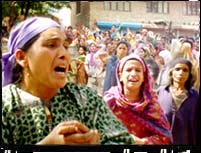So, then, does the UN have
a role?
New Delhi is convinced that it doesn't. Especially since India has no intention of holding a plebiscite in Kashmir. The view is that the accession of Kashmir is final, and there can be no dispute about its future.
"Our position is very clear. The UNMOGIP had a very specific mandate, and that was to monitor the CFL. Since the CFL no longer exists, it has no role," a government official reiterates.
Concerning the UN resolution on plebiscite, India's legal position is that the first part of that resolution calls on Pakistan to withdraw from the area it has occupied in Kashmir (known in Indian parlance as 'Pakistan-occupied Kashmir'; Pakistan prefers to call it 'Azad (free) Kashmir'). Pakistan hasn't complied, and in the absence of such compliance, India holds, the resolution has failed.
There is another aspect to the question. While Pakistan believes that any plebiscite must limit Kashmiris to choosing between the two contenders, the Kashmiris want a third option: independence. Many observers, especially from the West, believe that the Kashmiris would prefer to cut away from both countries. This, neither Delhi nor Islamabad want.
Today, Kashmir is de facto divided between India and Pakistan. The recent Kargil war, when India successfully defended the LoC like it would an international border, and the acceptance of the same by the rest of the world, has strengthened the Kashmiri division de jure.
In such a partition, the UN has little role to play. But the All-Parties Hurriyat Conference, the Srinagar-based umbrella organisation of separatist forces, doesn't agree.

"We still believe the UN has a role to play," says senior APHC leader Abdul Gani Lone. "After all, the resolutions are still pending in the UN and the UN thus is seized of the matter." Lone insists that delay in implementation do not destroy a resolution.
In legal terms, Lone is right. A resolution once introduced is not cancelled but stays pending. Only another resolution can cancel an earlier one; so far no resolution has been introduced to cancel the call for plebiscite.
"There are about 500 to 600 resolutions pending in the UN today, all of which have little chance of being implemented," points out an official of India's external affairs ministry. India is not interested in introducing a resolution to cancel the earlier resolution because that would only ignite interest in Kashmir again. Let sleeping dogs lie, is the philosophy.
Implementing a resolution depends on international politics and strategic concerns. It is power politics that has the final say. No resolution against Israel has to date been implemented, but the ones calling on Iraq to pull out of Kuwait were supported overwhelmingly. Not surprisingly, the UN is seen as the United States' puppet.
"We realise that the UN can do very little," Lone adds. "After all, India is a big and powerful country and the US and India are getting closer. With the US on India's side, we don't expect any resolution to be implemented."
That is what India wants.
Day 8, December 16: 'God, why was I born a Kashmiri?'




